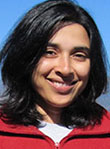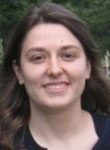Three 'rising stars' boosted with Sloan fellowships
By Bill Steele
Three Cornell assistant professors have received fellowships from the Alfred P. Sloan Foundation, whose awards honor early-career scientists and scholars “whose achievements and potential identify them as rising stars, the next generation of scientific leaders.”



The fellows are Nandini Ananth, assistant professor of chemistry and chemical biology; Amy Williams, the Meinig Family Assistant Professor in Life Science in the Department of Biological Statistics and Computational Biology; and Melissa Warden, assistant professor and Miriam M. Salpeter Fellow in neurobiology and behavior.
“The beginning of one’s career is a crucial time in the life of a scientist,” said Paul L. Joskow, president of the foundation. “For more than 50 years the Sloan Foundation has been proud to celebrate the achievements of extraordinary young scientists who are pushing the boundaries of scientific knowledge.”
Fellows receive $50,000 to further their research.
Ananth develops and applies theoretical methods to simulate chemical reactions at the quantum level. In a chemical reaction, electrons move within and between atoms, but we can no longer think of electrons as tiny baseballs obeying the laws of classical physics, Ananth explains. They are in constant interaction with other electrons and the nuclei of atoms, following the rules of quantum mechanics, where the state of a particle may be affected by the state of others, even without a physical connection.
But she has developed simulations where, as she puts it, “The computer thinks it’s doing classical physics,” to see how these reactions work and, perhaps, how to control them. In particular, her research group is working to understand electron transfer in organic molecules and transition metal complexes. “We may be able to tell the materials scientists how to tweak macroscopic factors that would change the behavior of electrons,” she said. Long-range goals are to develop efficient photovoltaic devices and catalysts that split water into hydrogen and oxygen.
Williams analyzes large-scale genetic databases to learn about human genetic history, evolution and the genetic basis of human disease.
Her computer analysis identifies haplotypes – sequences of DNA that are repeated in many genomes. The algorithms she has developed can search out matching sequences in datasets containing the genomes of up to 100,000 individuals or more. She also studies the way genes can be altered during meiosis, the process that splits chromosomes in half to prepare for reproduction.
Warden traces the path of nerve signals in the brain to learn how motivation works – and how, when it doesn’t work, we suffer from depression. Neurons in the frontal cortex, an area of the brain responsible for planning and reasoning, connect down a long path to primitive areas of the brain stem that deal with stress, reward and arousal. If the signals fail, that part of the brain may decide it’s not worth the effort to do anything, and the result can be clinical depression.
Using a technique called optogenetics, Warden genetically modifies neurons in the brains of mice to make them manufacture a light-sensitive protein. Stimulating these neurons with a pulse of light delivered through a microscopically thin optical fiber, she can observe what other neural pathways respond, as well as observing the behavior that results.
Media Contact
Get Cornell news delivered right to your inbox.
Subscribe